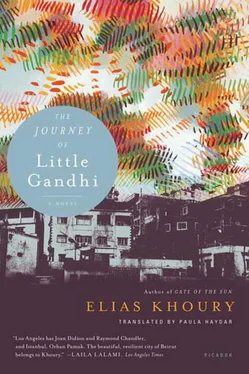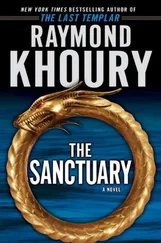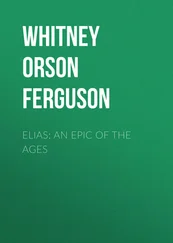Alice said it was the first time she really saw him. Before then she hadn’t seen him for what he was. And now there he was, standing there, his wife standing there next to him. Alice leaned over the side entrance to the living room, alongside the dining room, and didn’t say a word.
His wife asked him for a divorce.
“Divorce me, Tannous. Divorce me and marry this whore, I don’t care, but let me go. They told me, but I wouldn’t believe it. George’s wife told me, but I didn’t believe her. She told me, Your husband is having an affair and you think he’s out working all night. You’re an idiot. She told me I was an idiot. And you’d come home early in the morning tired and dead. I’m the dead one now.”
She started screaming and threw herself onto the floor, trembling. Alice thought she might have passed out, so she ran to the kitchen and brought some orange blossom water and sugar and kneeled over her.
“Get up. God help you.”
The woman pushed the flower water away and stood up.
“Come with me, you son of a bitch, I’ll tell everyone about you.”
At this point something strange happened. Alice was expecting Tannous to yell at her or hit her, but instead he bowed his head to her and went home.
And whenever Alice would remember him after that, she’d think of a white puppy dog with his tail between his legs. Maybe it was because she’d told the story so many times and she’d always end it by saying, “He put his tail between his legs and followed her home.” Or maybe it was because of his white pants and white shirt, everything about him was white when he left. Like a white puppy dog with his tail between his legs.
He disappeared for a whole week. Then he came back and told Alice he loved her, but he couldn’t live with her anymore.
She told him it was over, that she’d packed up his things in a suitcase and would leave the house at the end of the month and she’d rented a small apartment in Ayn Mraysi.
When she said good-bye to him she didn’t feel anything. Even when he insisted on making love to her and she accepted, she didn’t feel anything. Then came the sorrow. She was struck with a grief so terrible she couldn’t talk about anything anymore. At one point she considered committing suicide and almost did with a leather belt she bought for Tannous’s thirty-third birthday but never gave him.
He had told her, It’s only three months until I turn thirty-three and die, just like Jesus Christ.
At the time, Alice laughed at him and his illusion and she went out and bought him the belt. But he left before his birthday came.
Alice was frightened by the religious spells that overcame that man. Often after sleeping with her he’d start praying in Syriac. He’d chant an entire Maronite liturgy naked and then he’d begin his political speech.
She took the belt and decided to hang it from the ceiling and kill herself. She got a chair, stood on it, and tried to tie the belt to the metal ring attached to the ceiling for the light bulb. She tied it to the ring and came down. She burst into tears and climbed onto the chair, but instead of hanging herself she untied the belt. She got down and ran to the porch and threw it. Then she burst into a mixture of laughter and tears.
When Gandhi listened to these stories he felt stupid, because he had no stories like these of his own to tell. He lived a life of safety and stability. His few adventures into the whorehouse passed without much excitement; watching the television, the woman watching and refusing to take off her bra and telling him to hurry up — none of these was stories worth telling.
On the other hand, the story of his daughter was entirely different, and the suffering she caused him while he took her from sheikh to sheikh. This was a story that made him sad and quiet. And Husn didn’t care about anything except Madame Nuha. But why? Was it because he was jealous, or because he really loved her, or because she gave him money? Husn never told anyone the real story about that woman. Actually, he told Rima a little bit of it. He told her about his feeling of superiority with her, of feeling like a complete man.
Husn didn’t tell the truth and the truth cannot be told. That’s what he believed, because when it is told it becomes like a lie, and then it loses its importance. Instead the story itself becomes the issue.
Husn’s problem, or Ralph’s, as Madame Nuha Aoun used to call him, was simple. For Ralph, whose father sent him to the Evangelical School in Beirut, through the good offices of the Reverend Amin and Dr. Atef Nazzal and others, declared himself useless.
“Your son is a lost cause, Mr. Gandhi,” the principal, Mr. Nabih Khouri, told him. “He’s a lost cause, he’s failing everything. His mind is not on his studies. You should find him some trade to learn and let him work.”
Gandhi had wanted Husn to become a doctor, like Atef Nazzal, who had become a good friend of Gandhi’s. Through Atef, Gandhi discovered that doctors were regular people like everyone else. Husn should become a doctor, but he was hardheaded and didn’t study. He spent his time watching TV and playing pinball.
After long discussions, lots of effort, and lots of patience, Gandhi finally gave in to his son’s plan. He said he’d found a job. Husn was nineteen years old, of medium height but on the short side, had black hair that was kept meticulously neat, and small eyes. He didn’t look anything like his father except for his dark olive complexion and the way he stuttered when he spoke.
Husn decided to leave school because he hated the atmosphere of being under house arrest, and because he was a “lost cause,” as the principal had told his father. He got himself a job in Ahmad’s Hair Salon on Madame Curie Street in Beirut. The work fascinated Husn. It was in the salon that he changed his name to Ralph, and it was there he discovered the world of perfumes.
He’d come early in the morning, mop the salon with this fragrant soap. He’d pour out the liquid soap, which had a yellowish color to it, and mop the floors. Then he’d rearrange the chairs and wipe them with a brown cloth and wait. He was crazy about women’s hair. When he’d watch the strands falling through Master Ahmad’s fingers, he felt he was watching a real magician. He’d breathe in the smell of the dyes and spray and perfume. Ralph’s relationship with the salon was his entrance into the world of women. There he saw women; women quite different from the wives of the refugees who were forced out of their villages in the south and were living on Hamra Street. They were fashionable, sexy, speaking in Arabic and French and with them Ahmad the hairdresser was a magician. After having their hair shampooed by Rafiq, Ahmad’s assistant, they would flirt with him and wait without getting bored as they told their stories and jokes, laughing and giggling before Ahmad’s wandering glimmering eyes. Magazines and pictures and women and Ralph would watch while nobody paid any attention to what he was doing. After a while, Ralph began to learn how to shampoo hair, and here the real ecstasy began. His fingers would slide through their hair and the women would melt in his hands, heads laid back on the metal basin. They’d surrender to their flowing hair while the smell of apples emanated from his hands. Actually this smell was a mixture of apple and other perfumes that reminded one of jasmine; it intoxicated Ralph. His hands would dive into their hair, into their closed eyes, as Ralph worked in a state of semiconsciousness. The smell made him dizzy and the feel of hair sent chills running up and down his spine. Then the women would get up with their wet hair, sit under the dryer, and start talking. Ahmad would cut and style, and when he was all done he’d give them what looked like a metal sash to wear before spraying their hair.
Читать дальше












